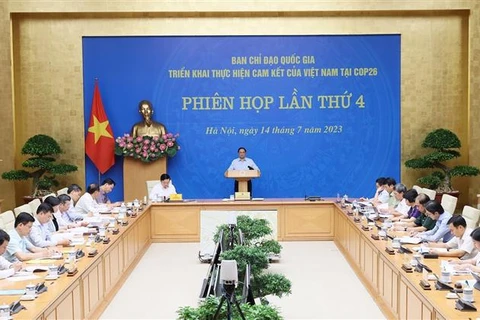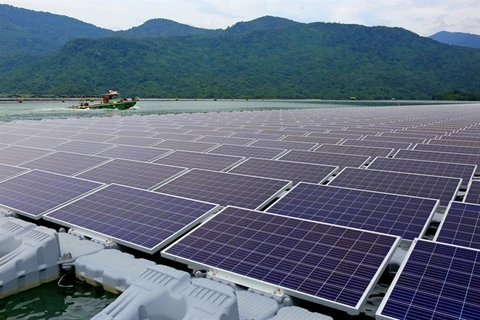 Addressing climate change, promoting green growth, and ensuring sustainability require the mobilisation of green finance resources. (Photo: VietnamPlus)
Addressing climate change, promoting green growth, and ensuring sustainability require the mobilisation of green finance resources. (Photo: VietnamPlus) Hanoi (VNA) - With Vietnam aiming to achieve net-zero emissions by 2050, the Prime Minister has issued a financial strategy toward 2030, outlining perspectives and solutions to mobilise resources domestically and internationally for green economy and environmental protection activities.
According to estimates from the United Nations Development Programme (UNDP), to achieve the commitment of achieving net-zero emissions by 2050, Vietnam needs about 330-370 billion USD.
A 2023 report from Aon plc – a leading global risk solutions company – revealed that Vietnam is among the five countries most vulnerable to climate change. In 2022 alone, natural disasters caused the nation economic damages of up to 19.5 trillion VND (830 million USD). The concern was heightened as this figure increased exponentially by 3.4 times compared to 2021.
A group of experts from UNDP also pointed out that with its extensive coastline, Vietnam faces an increasing risk of more severe natural disasters, leading to significant damages to people and the economy. However, its current risk management measures are still insufficient. Therefore, the Southeast Asian country needs to develop a strategy to build sustainable recovery capabilities. Otherwise, its efforts and economic growth momentum in the coming decade could be wiped out by natural disaster.
 Vietnam is utilising various funding sources to cope with and address the consequences of natural disasters, including the central and local budget reserves. (Photo: VietnamPlus)
Vietnam is utilising various funding sources to cope with and address the consequences of natural disasters, including the central and local budget reserves. (Photo: VietnamPlus) On this issue, the National Institute for Finance under the Ministry of Finance stated that the financial needs are on the rise to compensate for losses from large-scale climate-related disasters in Vietnam.
Vietnam currently lacks a comprehensive strategy to coordinate and optimise the mobilisation of funds, especially at the local level, and to build a financial protection strategy against costs incurred by risks from pandemics and disasters related to climate change. In terms of finance, Vietnam is using several financial sources to respond to and mitigate the consequences of natural disasters. These include the central and local budget reserves, specific budget allocations, State material reserves, financial reserve funds, disaster prevention and control funds, and aid from donors.
Currency losses and financial shortages resulting from climate-related disasters require the establishment of a financial plan to limit the burden. Previously, on February 10, 2022, the Ministry of Finance signed a Memorandum of Understanding (MoU) to become the eighth member of the Southeast Asia Disaster Risk Insurance Facility (SEADRIF). With the participation, Vietnam has many opportunities to observe, learn, and access technical and financial solutions regionally and internationally to enhance financial protection against natural disasters. Consequently, the government will have more comprehensive information to determine effective tools.
According to Deputy Minister of Finance Cao Anh Tuan, the tax policy system aimed at green growth and sustainable development focuses on two main policy groups. These are limiting environmentally harmful behaviours and of supporting and encouraging environmental protection activities.
Sharing international experience, Philipp Roesler, former Deputy Prime Minister of Germany, suggested that Vietnam needs to approach this path cautiously and decisively, balancing economic progress with environmental protection awareness. In this journey, financial policies play the role of the "steering wheel," directing investments, shaping the market, and encouraging environmentally responsible actions.
 Traditional industries, the backbone of the economy, may conflict with new financial policies such as environmental taxes or green bonds. (Photo: VietnamPlus)
Traditional industries, the backbone of the economy, may conflict with new financial policies such as environmental taxes or green bonds. (Photo: VietnamPlus) To ensure a comprehensive and thorough transition to a greener economy, policymakers need to connect all societal components, including influential local entrepreneurs and the general public. Building financial policies should be a long-term vision, considering risk mitigation measures and adaptable systems, Roesler emphasised./.
























